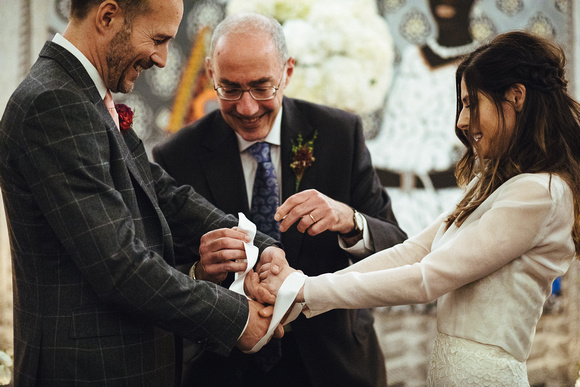
by Michael | May 4, 2018 | Blog
You may know the term “officiant” better as “civil celebrant”. Or you may not have even heard of either term!
If you’re planning a life-cycle ceremony like a wedding, it might be well worth your while to make the acquaintance of either. (By the way, the first term is the American version of the second.)
Why might you need one (or the other!)?
If you’re planning your wedding, it may not be a traditional religious service that rocks your boat. In truth, the idea of a register office ceremony may not appeal too much either. Many people shrug and accept it – “that’s the done thing” – but think again: it doesn’t have to be thus.
What does a wedding celebrant do?
A celebrant will give you ideas, listen to yours, develop them and then write a service that incorporates what you want and that reflects your wishes and personality. They then conduct the ceremony professionally on the day.
The best celebrants have three qualities: they listen well, write well and present well. None of those are particularly common in combination, so don’t underestimate this skill-set.
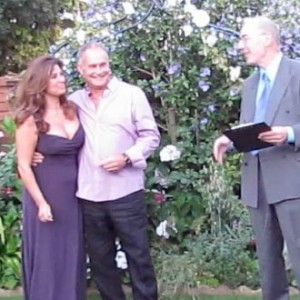
What does a celebrant offer?
- A celebrant will be a trained professional. He (for simplicity, I shall use the masculine throughout) will know what can go into a ceremony and how to structure it, and will be glad to advise and inspire you.
- Celebrants are not usually teenagers or youngsters straight out of college. This is probably not their first job nor is it likely to be their only one at any given time. They usually have some life and work experience, and this can be invaluable for practical and/or imaginative suggestions and advice.
- A good celebrant will take time to listen to you and understand your wishes. If you have an unusual theme or vision, that should not be a problem. The ceremony should reflect your individuality, so it will be tailor-made.
- The celebrant is a kind of choreographer. Depending on your wishes, he can organise entrances and exits, where people stand, how the rituals are enacted and what happens when.
- The celebrant will write a ceremony from scratch. This means that your service will be unique. If the celebrant enjoys writing, he will take trouble to source or compose beautiful and meaningful readings and prayers (as desired). The result will reflect this care and dedication.
- The celebrant will be prepared – indeed, probably keen – to do some research, if you want to introduce something unusual into your ceremony. For example, a particular religious or cultural element.
- The celebrant uses a script. You agree it with him, as you go along. So not only will you have been consulted before and during the creative process but you will not be faced with any unpleasant surprises on the big day. That should be worth quite a lot to your peace of mind!
- Not only does the celebrant need presence but he should be a good presenter. He needs good diction, audibility and the ability to avoid talking in a boring, monotonous drawl. He will be able to project his voice, and vary the pitch, modulation and speed, to bring out the emotion of the moment and involve the audience.
You may well be looking to save some money here and there, and I sympathise entirely. But unless you are very lucky, the chances are that, to find someone who will listen to you, write what you want in a memorable way and present it effectively and professionally, a celebrant will be your answer. (Or an officiant!)
Surprisingly enough, that’s what Michael does for a living! Feel free to contact him for a non-obligation chat.
Main photo: www.lyndseygoddard.com
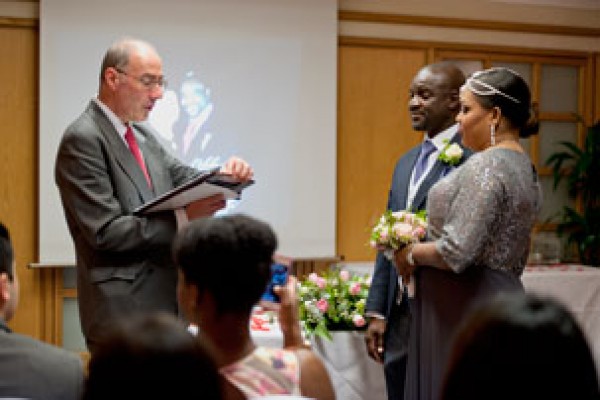
by Michael | Apr 24, 2018 | Blog
You know how conversations go in unexpected directions? I thought an acquaintance of mine had merely been on holiday. Actually, she had gone on a cruise. While at sea, the captain performed a lovely vow renewal ceremony, for herself and her husband.
Why hadn’t she thought of using me?! I had to forgive her because she wasn’t aware that I could have conducted such a ceremony. (Mea culpa …)
I wonder if the smart naval uniform might have had something to do with it too?!
I asked what had made them opt for the ceremony. They were celebrating 13 years together, and renewing their vows “just seemed like a good idea at the time”. And why not?
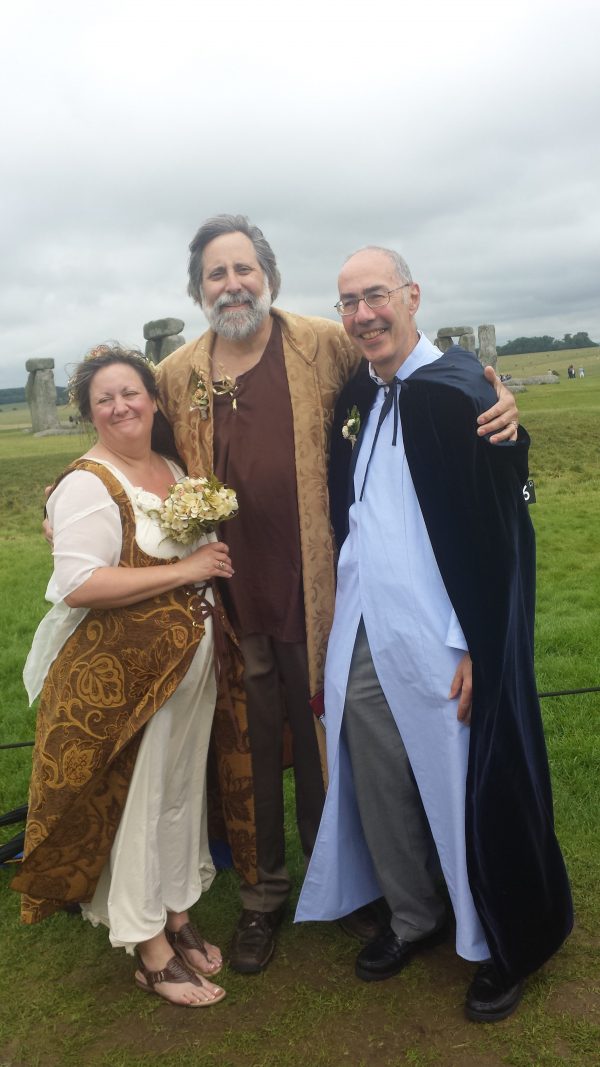
Not quite the naval uniform, though …!
So why bother renewing your vows?
- You may, like my acquaintance, be in a secure relationship, and want to mark it publicly.
- Perhaps you want to celebrate an unorthodox number (such as a 13th anniversary); commemorating a significant milestone (ending in a 5 or 0) makes sense too.
- You may originally have eloped or had a small wedding, and would now like to share your delight with your friends/family.
- Maybe your wedding didn’t meet expectations for some reason (poor weather, an argument, disappointing service) and you want to make up for it.
- You’ve come through a rough time (infidelity, illness, financial difficulties) and want to affirm to the world that you are sticking by (and with) each other.
- You want to strengthen your relationship by a public reaffirmation.
What you won’t need
Because a vow renewal is not a wedding, you won’t have to worry about any of these:
- Rings
- Hen party/stag do
- Wedding list (no, come on, you don’t need any more presents!)
- Stuffy rituals (you can organise what you want, if you have a civil celebrant)
- Venue (you can do this almost anywhere)
- A reception (unless you choose otherwise)
Organising a vow renewal is simple enough.All you have to do is fix a time, place and a date, invite some friends and choose an officiant – oh, and look forward to a wonderful, meaningful day!
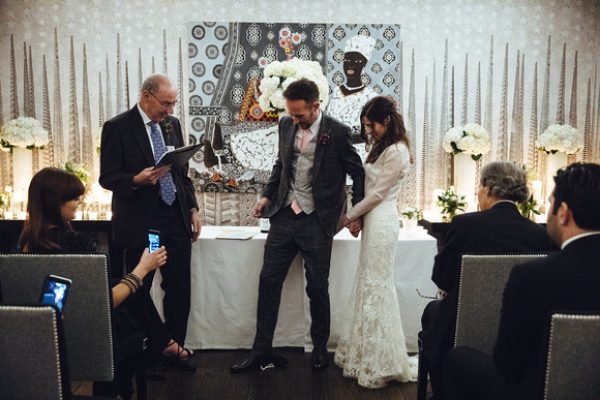
by Michael | Apr 12, 2018 | Blog
Choosing a celebrant is a bit like choosing a plumber. Without a personal recommendation, you have to go by the website – and instinct. If you get your choice wrong, it can be costly in more than one way.
So, unless you know someone who has already used the celebrant, the website is the first port of call.
Website
You will probably find some testimonials there. Take time to read at least a few. You can get a good idea about the celebrant’s service from them.
You can ask to be connected with people who have already used the celebrant’s services. That’s a good beginning.
There may be photos or videos on display. These will help you to ‘get to know’ the officiant a bit. If you’ve taken a dislike to the celebrant at this stage, don’t go any further with them. You will need to get on with and feel at ease with them – especially on the big day.
Direct contact
You should of course contact the celebrant – and arrange either a face-to-face meeting or a Skype call. That should cost nothing, so you are not committed at that stage. Following that initial conversation, you will be able to answer two vital questions:
- can the celebrant communicate well? Can they speak well and also listen well?
- do you feel a rapport with them? Are they friendly, experienced and professional?
You may have plenty of questions. That’s fine. You may want to be led by the hand and take advice every step of the way, or you may prefer to insist on all the details yourself. Usually, it’s a combination. What matters is that you are happy with the outcome.
What you need to know
You should receive clear information about the celebrant’s terms and conditions. You will need to know the celebrant’s method of working with you. Cheapest is not always best, of course, and you will have to judge what you can afford to pay.
By all means, compare a couple of celebrants. Don’t let price influence you unduly. What really matters for your special event is whether the celebrant can deliver exactly what you want. You don’t want compromise.
Ideally, your celebrant will allow you to create your perfect ceremony, guiding you clearly and inviting your full participation. He will then conduct the ceremony professionally, memorably and with warmth.
If you follow these tips, you should be sure of receiving the greatest assistance and satisfaction in the build-up to what is certainly the most important day in your life.
Guess what? Michael can help you, and is just waiting for you to contact him!
Photo: www.lyndseygoddard.com
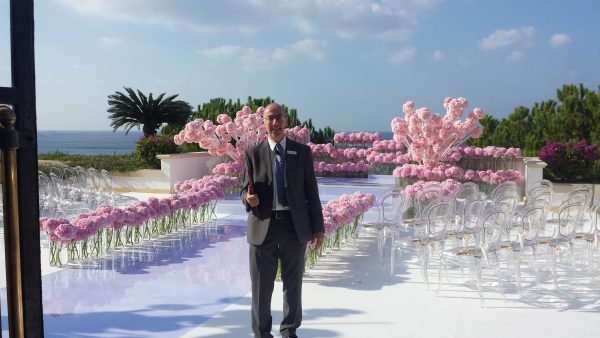
by Michael | Mar 8, 2018 | Blog
Where do you begin, when planning your wedding?
If nothing else, consider these points:
- The budget
Obviously, this is the bottom line. You need to work together with anyone who is helping you here (probably your family?), and decide rationally what you will spend. It’s no good getting carried away with enthusiasm – you need self-discipline.
Big as the occasion may be, you do not want to bankrupt yourselves. And it’s worth pointing out that the amount spent does not guarantee the success of the marriage itself!
The event is (or should be) a ceremony; it should not be an attempt to show off how rich or extravagant you are. Should the reception mean more than the vows?
Good taste and sincerity are more important.
This doesn’t mean that you can’t have a few OTT touches (budget permitting), but these should be a bonus rather than what you are aiming at. There are probably certain elements that you will insist on, and it’s as well to discuss these at the outset, so that they aren’t overlooked later.
The budget will also dictate the ceremony, participants, reception and number of guests to invite, but that is something I cover elsewhere, notably in my book “Your Wedding Guide”.
- Date & location
Naturally, it will be more expensive to schedule your wedding at peak times (such as summer holidays, Christmas or around Valentine’s Day). You may want to avoid major events, such as World Cups and holiday season, when your potential guests may be otherwise engaged.
You’ll need to consider climate too, if you want an outdoor wedding. Or, at least, a Plan B.
The venue should, of course, be where you want it to be, but if it’s in an exotic location, your guests may have to go to a lot of expense and trouble to attend, so keep that in mind.
Make sure you visit the venue, ask questions and ensure that you really want to have your ceremony there.
- Other Suppliers
As soon as you have settled on your budget, start choosing other suppliers that you may need. Like the venue, which may want a year or more advance warning, you should allow plenty of time, in order to secure the supplier of your choice.
Among others, you will need to consider florists, caterers, musicians and, not least, celebrant. Where possible, you should meet with these first, so you can feel confident you have made the right choices. All that takes time, so allow for that.
- Choosing theme and colours
It’s easy to get excited and let your imagination run away with your wallet. Keep your budget in mind, use wedding books and planning guides and whatever resources are available to you.
Do not over-decorate. Make full use of flowers and candles.
Be creative with the colours. These may reflect the bride’s personality. Vivid colours (tastefully combined) can be most effective.
- Vows and music
The vows are one of the most important elements of a marriage. They should be well-planned – and audible. They are a public declaration of your mutual feelings, and should not be under-valued.
Equally, the music should be planned carefully and be clearly audible. Make sure you choose lyrics that you want your guests to hear!
Hopefully, the planning will be a team effort (maybe even the groom will be willing to participate!). If approached in the right way, it can be enjoyable and exciting, and the result will be so worthwhile.
For further advice, please contact Michael.

by Michael | Mar 6, 2018 | Blog
Most people assume that a wedding is either a religious affair (which involves following the regular marriage service liturgy) or a register office ceremony (following a standard non-religious script). Both are standardised and scarcely, if at all, personalised.
By the way, I have nothing at all against religious weddings. That’s how my wife and I married, and it was exactly what we wanted.
Register office ceremonies may be all that certain people want, and I’m fine with that.
Another option
But what if religion isn’t really your thing? What if you’re ‘marrying out’ and your church won’t let you have a full service? What if you don’t want the formulaic ceremony of the register office, but want something bespoke?
Then, of course, the civil celebrant can offer you something special that can tick all your boxes.
But it isn’t legal, is it?
According to current legislation, every wedding needs to be legally registered (which is where a registrar comes in).
If you want a personalised ceremony, this needn’t be a problem. Just go down to the register office (at a pre-arranged time) with two witnesses, get legally married and then have the wedding ceremony that YOU want in front of your guests at a place YOU choose.
If you’re marrying in a licensed venue, you can be a little creative – why not have the registrar’s part done first (even in a different room!) before enjoying the festive part in front of all your guests, relaxed and joyous?
So what’s “personalised” about it?
By definition, no two personalised weddings will be the same! However, this is how the finished product may be arrived at.
After an initial chat of maybe an hour, the civil celebrant will have given you a few ideas, explored your wishes and learnt a bit about you and your story.
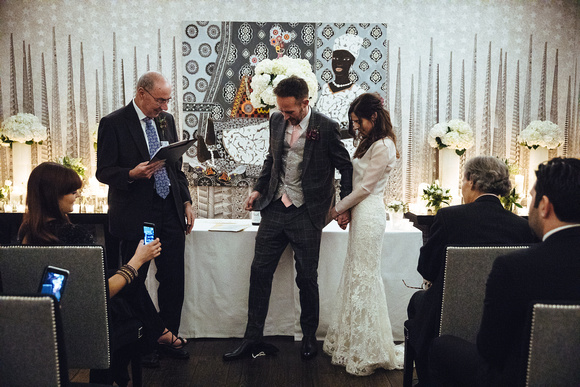
“Breaking the Glass” ritual
Depending on what you choose, you can include readings that reflect your personal beliefs (prayers, poems, prose) and control who reads and who participates. Any procession and/or recessional, music, rituals – all can be chosen by you to make a memorable and meaningful ceremony for YOU – and your guests.
Your wedding is probably the biggest, most significant day of your life, so surely it makes sense for you to be able to choose how, where and with whom you celebrate it!
Ask Michael for more information.
Photos courtesy of www.lyndseygoddard.com







